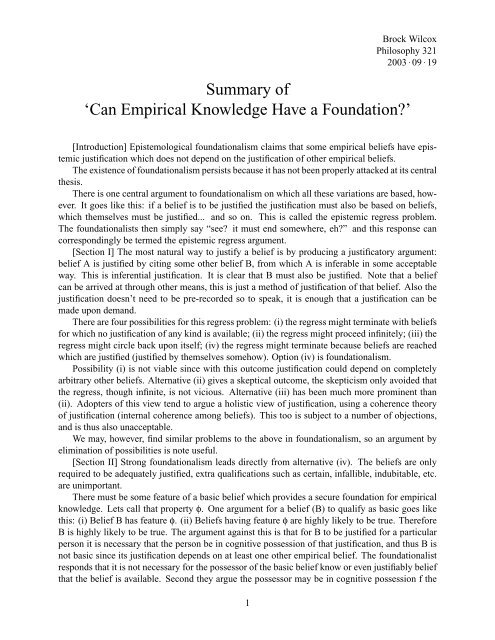Can Empirical Knowledge Have a Foundation? - The Lack Thereof
Can Empirical Knowledge Have a Foundation? - The Lack Thereof
Can Empirical Knowledge Have a Foundation? - The Lack Thereof
Create successful ePaper yourself
Turn your PDF publications into a flip-book with our unique Google optimized e-Paper software.
Brock Wilcox<br />
Philosophy 321<br />
2003 ¡ 09 ¡ 19<br />
Summary of<br />
‘<strong>Can</strong> <strong>Empirical</strong> <strong>Knowledge</strong> <strong>Have</strong> a <strong>Foundation</strong>?’<br />
[Introduction] Epistemological foundationalism claims that some empirical beliefs have epistemic<br />
justification which does not depend on the justification of other empirical beliefs.<br />
<strong>The</strong> existence of foundationalism persists because it has not been properly attacked at its central<br />
thesis.<br />
<strong>The</strong>re is one central argument to foundationalism on which all these variations are based, however.<br />
It goes like this: if a belief is to be justified the justification must also be based on beliefs,<br />
which themselves must be justified... and so on. This is called the epistemic regress problem.<br />
<strong>The</strong> foundationalists then simply say “see? it must end somewhere, eh?” and this response can<br />
correspondingly be termed the epistemic regress argument.<br />
[Section I] <strong>The</strong> most natural way to justify a belief is by producing a justificatory argument:<br />
belief A is justified by citing some other belief B, from which A is inferable in some acceptable<br />
way. This is inferential justification. It is clear that B must also be justified. Note that a belief<br />
can be arrived at through other means, this is just a method of justification of that belief. Also the<br />
justification doesn’t need to be pre-recorded so to speak, it is enough that a justification can be<br />
made upon demand.<br />
<strong>The</strong>re are four possibilities for this regress problem: (i) the regress might terminate with beliefs<br />
for which no justification of any kind is available; (ii) the regress might proceed infinitely; (iii) the<br />
regress might circle back upon itself; (iv) the regress might terminate because beliefs are reached<br />
which are justified (justified by themselves somehow). Option (iv) is foundationalism.<br />
Possibility (i) is not viable since with this outcome justification could depend on completely<br />
arbitrary other beliefs. Alternative (ii) gives a skeptical outcome, the skepticism only avoided that<br />
the regress, though infinite, is not vicious. Alternative (iii) has been much more prominent than<br />
(ii). Adopters of this view tend to argue a holistic view of justification, using a coherence theory<br />
of justification (internal coherence among beliefs). This too is subject to a number of objections,<br />
and is thus also unacceptable.<br />
We may, however, find similar problems to the above in foundationalism, so an argument by<br />
elimination of possibilities is note useful.<br />
[Section II] Strong foundationalism leads directly from alternative (iv). <strong>The</strong> beliefs are only<br />
required to be adequately justified, extra qualifications such as certain, infallible, indubitable, etc.<br />
are unimportant.<br />
<strong>The</strong>re must be some feature of a basic belief which provides a secure foundation for empirical<br />
knowledge. Lets call that property φ. One argument for a belief (B) to qualify as basic goes like<br />
this: (i) Belief B has feature φ. (ii) Beliefs having feature φ are highly likely to be true. <strong>The</strong>refore<br />
B is highly likely to be true. <strong>The</strong> argument against this is that for B to be justified for a particular<br />
person it is necessary that the person be in cognitive possession of that justification, and thus B is<br />
not basic since its justification depends on at least one other empirical belief. <strong>The</strong> foundationalist<br />
responds that it is not necessary for the possessor of the basic belief know or even justifiably belief<br />
that the belief is available. Second they argue the possessor may be in cognitive possession f the<br />
1
elief, but that their cognitive grasp of the premises required consist only of intuitions or immediate<br />
apprehensions.<br />
[Section III] <strong>The</strong> ‘externalist’ (term given by Armstrong) view is this: the person who has<br />
a basic belief need not be in possession of any justified reason for his belief and need not even<br />
think that there is such a reason; the status of their belief depends solely on the external relation.<br />
<strong>The</strong> argument then goes like this: (i) Belief B is an instance of kind K. (ii) Beliefs of kind K are<br />
connected in a law-like way with the sorts of states of affairs which would make them true, and are<br />
thus highly likely to be true. <strong>The</strong>refore B is highly likely to be true.<br />
However, the regress problem comes from the person needing to know some set of premises to<br />
justify a belief, and this technique amounts to waiving this general requirement in cases where the<br />
justification takes a certain form. Certainly externalism seems plausible since the person would<br />
not go wrong in accepting a belief based on one of these external relations, but even so this does<br />
not justify the person’s acceptance of the belief. Externalism, then, seems to be abandoning the<br />
traditional notion of epistemic justification and along with it anything resembling the traditional<br />
conception of knowledge. Though that might be a good thing, it inadvertently means that the<br />
externalist view is not a solution to the regress problem.<br />
[Section IV] <strong>The</strong> second foundationalist response to the regress problem (the standard solution)<br />
is the traditional doctrine of cognitive givenness. Givenness is the idea that basic beliefs are<br />
justified by reference not to further beliefs, but rather to states of affairs in the world which are<br />
immediately apprehended, directly presented, or intuited. Let there be a basic belief that-p which<br />
is supposedly to be justified by reference to a given or immediately apprehended state of affairs.<br />
It is this immediate apprehension of the state of affairs which justifies this belief. <strong>The</strong> three items<br />
present in this situation are: the belief, the state of affairs which is the object of the belief, and the<br />
intuition or immediate apprehension of the state of affairs.<br />
<strong>The</strong> third aspect seems to be a cognitive state which involves the assertion that-p. <strong>The</strong>re are<br />
two alternative ways of looking at this aspect – that these immediate apprehensions are cognitive,<br />
or that they are non-cognitive. If the immediate apprehensions are construed as cognitive, then<br />
they will be both capable of giving justification and in need of it themselves; if the intuitions are<br />
non-cognitive, then they do not need justification but are also apparently incapable of providing<br />
it. If a person has no cognitive grasp of the state of affairs in question by virtue of having such<br />
a non-cognitive intuition then the intuition cannot give the person a reason for thinking that his<br />
belief is true or even likely to be true. Thus epistemological givenness is a myth.<br />
No account, then seems to be available of how an empirical belief can be genuinely justified<br />
in an epistemic sense, while avoiding all reference to further empirical beliefs or cognitions which<br />
themselves would require justification.













